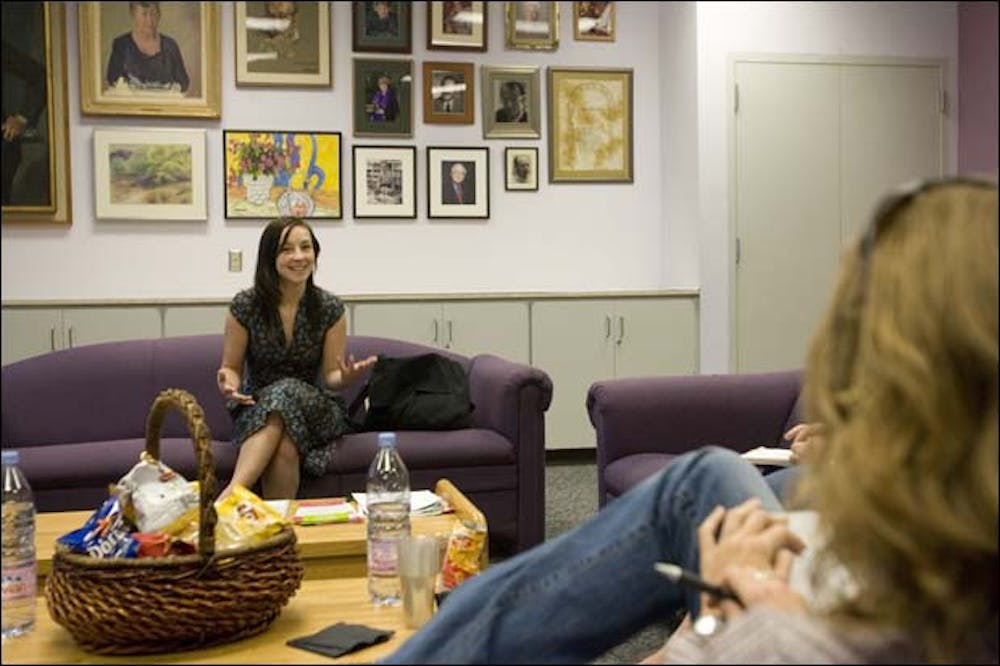Americans need to be more accountable for their purchases and aware of fair trade offerings, a student speaker said Wednesday at a Tempe campus event.
The ASU Graduate Scholars of English Association invited political science senior Charis Elliott, director of the nonprofit group Los Otras Hermanas, to discuss her efforts to promote fair trade.
There is a lot of confusion surrounding fair trade in the U.S., though many “green” companies use the term freely, Elliott said.
“Fair trade is a set of principles and standards that address methods that are eco-friendly,” she said.
According to her own research, “only 20 percent of people know what fair trade is, and only 10 percent actually buy it,” she said.
Compared to Europe, this difference is huge, she said.
“Europeans stopped buying certain products [because they weren’t fair trade],” she said. “There was a huge market demand for fair trade products.”
The demand even led European Wal-Mart stores to become the world’s leading consumers of organic fabrics, Elliott said.
“People have so much power to make change,” she said.
Now, she said, it’s Americans’ turn to change their buying philosophies.
“The money and the profits stay here, while the materials and labor come from somewhere else. Where’s the accountability in that?” she said.
“It lies with the consumer.”
Las Otras Hermanas partnered with a neighborhood alliance in Juárez, Mexico, called ALDEA, to build a small sewing facility in Juárez.
Elliott held up a trendy green skirt made by women in the co-op, even pointing out its small vintage buttons.
“It’s an entirely sustainable piece of clothing,” she said, and one that was created by women in Mexico who are given support and fair pay by their employers.
Through Las Otras Hermanas research, Elliot said she found that in border towns, where many American clothing factories are located, the cost of living is $33 per day for a family of four.
“Compare that to the $6 or $7 women are paid in those factories for 11-hour work days, six days a week,” she said.
Las Otras Hermanas and ALDEA attempt to fight that injustice by empowering the workers, she said.
“It’s not charity — it’s providing dignity and respect for the people who make these clothes,” she said.
Many Americans find fair trade clothing prices unreasonable, Elliott said, and they are often right.
She said her organization tries to provide items at affordable prices — blouses typically run $20, and the skirt she displayed is $35.
Elliott said her personal experiences inspired her work with Las Otras Hermanas.
“I grew up in Texas on cotton fields. We leased our land to cotton farmers. I saw young people working in the fields, and I grew up getting sprayed with pesticides,” she said.
Watching how the land and workers were treated inspired Elliott to become involved with activism, she said — particularly fair trade activism.
The way in which Americans generally run businesses is unfair to foreign and underprivileged nations, she said.
“We flood their markets with our cheap products and drive their prices down. We control the economies and industries of other nations,” Elliot said.
“You have to be conscious,” she said. “That’s how you’re going to change your life and change your world.”
English graduate student Jennifer Clifton, president of the Graduate Scholars of English Association, said she hoped Elliott’s discussion would draw in international students to share in the fair trade conversation.
“I wanted something for international students to be a part of and contribute their opinions to,” Clifton said.
Ginger Hanson, an English literature and conservation biology senior, said even though sustainable practices are currently part of the popular “green” movement, there is more work left to do.
“I know sustainability is a big trend right now, but I hope that fair trade becomes trendy right along with it,” she said.
Reach the reporter at jessica.testa@asu.edu.




